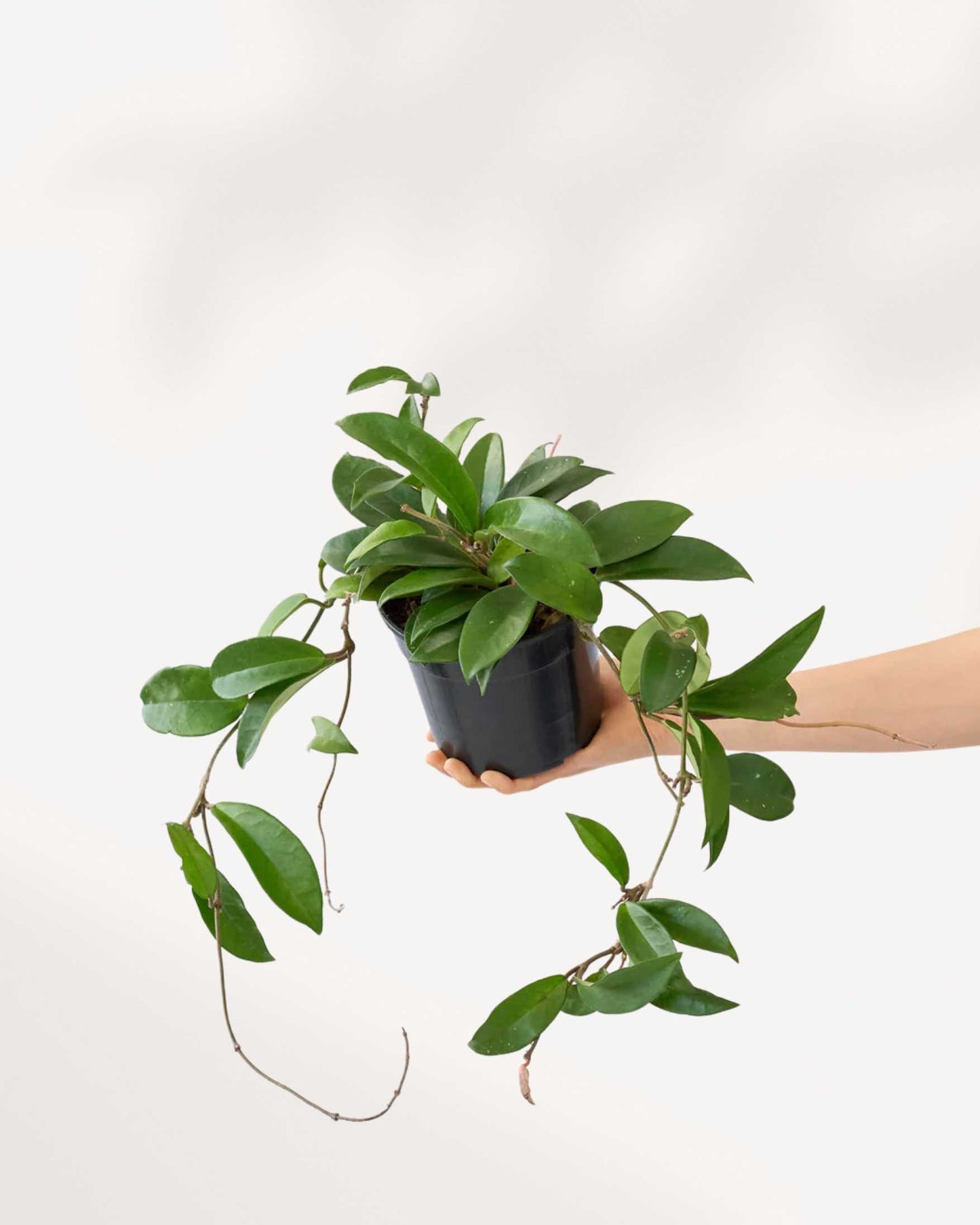Couldn't load pickup availability
Hoya Carnosa, also known as the "Wax Plant," is a timeless favorite among houseplant enthusiasts. Wax Plant features glossy, waxy leaves and produces clusters of fragrant, star-shaped flowers. Native to Southeast Asia and Australia, this low-maintenance plant is perfect for both beginners and experienced growers, thriving as a climbing or trailing vine.
Common Names
- Wax Plant
- Porcelain Flower
- Hindu Rope (for its compact variant)
Botanical Classification
- Kingdom: Plantae
- Order: Gentianales
- Family: Apocynaceae
- Genus: Hoya
- Species: Hoya carnosa
Description
Hoya Carnosa is characterized by its thick, waxy leaves that range from deep green to variegated shades. It produces star-shaped flowers in pink or white hues, often with a red center, releasing a sweet fragrance at night.
Hoya Carnosa is versatile plant can grow as a climbing or trailing vine, reaching lengths of up to 6-8 feet indoors with proper care.
Popular Hoya Varieties
- Hoya Krimson Queen – Variegated leaves with creamy-white edges.
- Hoya Macrophylla – Large, textured leaves with prominent veins.
- Hoya Compacta 'Hindu Rope' – Twisted, curly leaves ideal for hanging baskets.
- Hoya Carnosa Krimson Princess – Vibrant variegated foliage with pink highlights.
Care Guide
Light Requirements
Prefers bright, indirect light but can tolerate lower light levels. Direct sunlight should be avoided to prevent leaf scorching.
Watering Needs
Allow the top inch of soil to dry out before watering. Reduce watering in winter and ensure the pot has proper drainage.
Humidity
Thrives in moderate to high humidity (50-70%). Mist leaves occasionally or use a humidifier for best results.
Fertilization
Feed with a diluted, balanced liquid fertilizer every 4-6 weeks during the growing season. Reduce feeding in winter.
Common Pests
Mealybugs: Treat infestations with rubbing alcohol or insecticidal soap.
Spider Mites: Maintain humidity and treat with neem oil or insecticidal soap if needed.
Scale Insects: Remove manually and treat with horticultural oil or soap spray.
FAQs
How often should I water Hoya Carnosa?
Water when the top inch of soil is dry. Avoid overwatering to prevent root rot.
Is Hoya Carnosa pet-friendly?
Hoya plants are generally non-toxic, but ingestion may cause mild digestive issues. Keep out of reach of pets.
Does it need high humidity?
Yes, moderate to high humidity is ideal for optimal growth and flowering.
Is it an air-purifying plant?
Yes, it helps purify indoor air. Explore more air-purifying plants.
How to take care of Hoya Carnosa
Sun: Indirect
Sun: Indirect
Light: Medium - Low
Light: Medium - Low
Water: When fully dry
Water: When fully dry
Humidity: Any
Humidity: Any
Pet Friendly: Yes
Pet Friendly: Yes
Pro Tip
Pro Tip
Delivery Policy for Plant Condition
Delivery Policy for Plant Condition
"I have only received part of my order. What to do?
No worries if you've only got part of your order! Our plants come from different nurseries and might arrive in separate shipments, typically 1-2 days apart. It's all part of ensuring your green friends reach you in top-notch condition!
If you do not receive the remaining packages within 48 hours contact support at info@mygreenscape.ca
What is the Life Time Support?
Absolutely! Lifetime support means you can count on us whenever you have questions or uncertainties about your plant. Whether you're puzzled by its behavior or just want to ensure it's thriving, we're here for you. Connect with us on Instagram @mygreenscapeto or shoot us an email at support@mygreenscape.ca.
When it comes to our guarantee for plants shipped with standard or express, rest assured that we offer a 30-day happy healthy plant guarantee on all such shipments. This ensures that your plants are covered for 30 days after delivery, giving you peace of mind regarding their condition. If you have any concerns within this period, feel free to reach out to us for assistance.
For further details, please visit our Local Delivery, Store Pickup, Standard Shipping Guide Page.
What to expect
What to expect
Your plant will arrive in a standard nursery pot, typically 0.5" - 1" smaller than the stated size to seamlessly fit into your chosen decorative pot. Washable Paper Planter Bags are available for separate purchase.
Just like nature intended, each plant is unique, showcasing natural variations in size, shape, and characteristics. Our commitment is to deliver a plant that closely resembles the one featured on our website, matching your chosen size, and with the potential to thrive happily in your home.
Frequently Asked Questions
Frequently Asked Questions
Certainly! If you're pondering about ordering plants online, you're not alone. We've compiled the most frequently asked questions. Check out our FAQ section here for quick answers! Happy planting!
Plant & Pot Size Chart
Plant & Pot Size Chart
Choosing the right pot size for your plants can be a daunting task, especially if you're new to gardening. But fear not! Our pot sizes chart can help you find the perfect match for your plants, ensuring they have enough space to grow and thrive. With our guide, you'll be able to confidently choose the right pot size and plant variety for your gardening needs.
Plant Pot Size Guide.

| Extra Small | 7-10 cm | 2.5 - 3 inches |
| Small | 11-12 cm | 3.5 - 4 inches |
| Medium | 14-17 cm | 5 - 6 inches |
| Large | 19-21 cm | 8 - 10 inches |
| Extra Large | 24-27 cm | 12 - 14 inches |
All sizes are specified in product details.
Your Complete Guide to Pot Sizes: What Size Should You Choose?

When selecting a pot for your plant, it's important to find the right size. But with all the different options out there, how do you know which one is best? We're here to help!
MyGreenscape's pot sizes chart is a great resource for finding your perfect fit. Our easy-to-read chart takes out all the guesswork and helps you quickly choose the right size for your plant.
Smaller pots are best for seedlings or small plants just starting out. These tend to be shallow but wide, allowing enough room for the roots of the young plant but not too much where they get overcrowded. Medium-sized pots are ideal when your plant has grown from its infancy and is ready for more space. These are deeper and wider than small pots, so that it can accommodate larger root systems - making sure your plant gets enough nourishment while still giving it breathing room. Large pots are top choice if you have an established plant in need of lots of space - think trees and large shrubs! The spacious depth and width allow plenty of room for deep root systems without struggling for air or light.
No matter what size you choose, MyGreenscape has got you covered, with our pot sizes chart guaranteeing you find the perfect fit every time!
Winter Shipping Protection
Winter Shipping Protection
We take extra care with each package during the colder months. For destinations experiencing cold weather, we provide insulated packaging and heat packs as needed to protect your plants from freezing temperatures. With Winter Shipping Protection, your plants are equipped to arrive safe and sound, even in winter’s chill.
Care Guide
Care Guide
Explore essential care tips. check out our Comprehensive Resource for Indoor Plant Care.



WATERING MADE EASY
Check soil moisture before watering and use a potting mix that drains well. It’s the secret to healthy, happy plants!
Hear From Happy Plant Parents.
Who have brought Mygreenscape plants into their homes.







